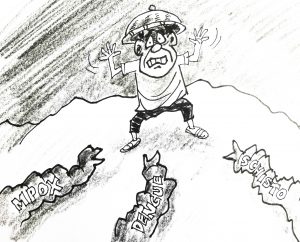As our country grapples with multiple health crises, the rising cases of dengue, monkeypox, and local schistosomiasis demand immediate attention. These outbreaks are not just isolated incidents but indicators of a broader public health challenge that requires urgent action. While government efforts are crucial, it is also the responsibility of each individual to prepare, address, and avoid these diseases to protect themselves and their communities. Failure to act now could lead to devastating consequences that strain our healthcare system and endanger lives.
Dengue, a mosquito-borne disease, has been a persistent threat in our country for years, with cases surging during the rainy season. The ongoing outbreaks highlight the need for enhanced community involvement in preventive measures, such as eliminating breeding grounds for mosquitoes, using insect repellents, and seeking early medical intervention when symptoms arise. Public awareness campaigns have repeatedly emphasized these steps, yet many still neglect basic precautions. We must take responsibility at the household level to prevent the spread of dengue by keeping our surroundings clean and staying vigilant against the disease.
Monkeypox, a viral disease that has recently spread to various regions, adds another layer of complexity to our public health landscape. Although less deadly than some other viral diseases, monkeypox can still cause severe symptoms and complications, especially in vulnerable populations. To curb its spread, individuals must practice good hygiene, avoid contact with suspected cases, and adhere to health advisories on vaccination and isolation. Community awareness and cooperation are key; the stigma surrounding monkeypox needs to be replaced with informed actions that protect public health rather than incite fear or discrimination.
Schistosomiasis, often overlooked compared to the other two, is a parasitic infection that affects communities with poor sanitation and limited access to clean water. The disease silently impacts rural populations, causing chronic illness and impairing quality of life.
Addressing schistosomiasis requires a multi-pronged approach that includes improving sanitation infrastructure, providing access to clean water, and conducting regular mass deworming programs in affected areas. Beyond government interventions, individuals in high-risk communities must be proactive in maintaining proper hygiene, avoiding contact with contaminated water, and participating in community health initiatives.
In facing these simultaneous outbreaks, the collective effort of the government, communities, and individuals is crucial. Preparedness is not just about reacting to outbreaks but about creating a culture of prevention. This means staying informed about the diseases that threaten us, taking necessary precautions, and supporting public health measures that aim to reduce transmission. We cannot afford to be complacent; our actions today will determine the health and safety of our families and communities tomorrow.




